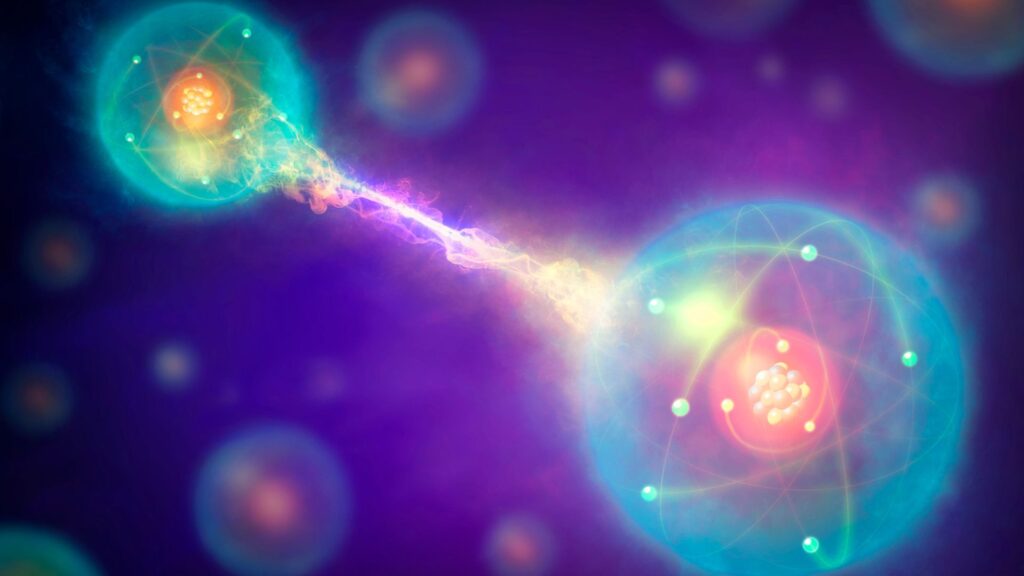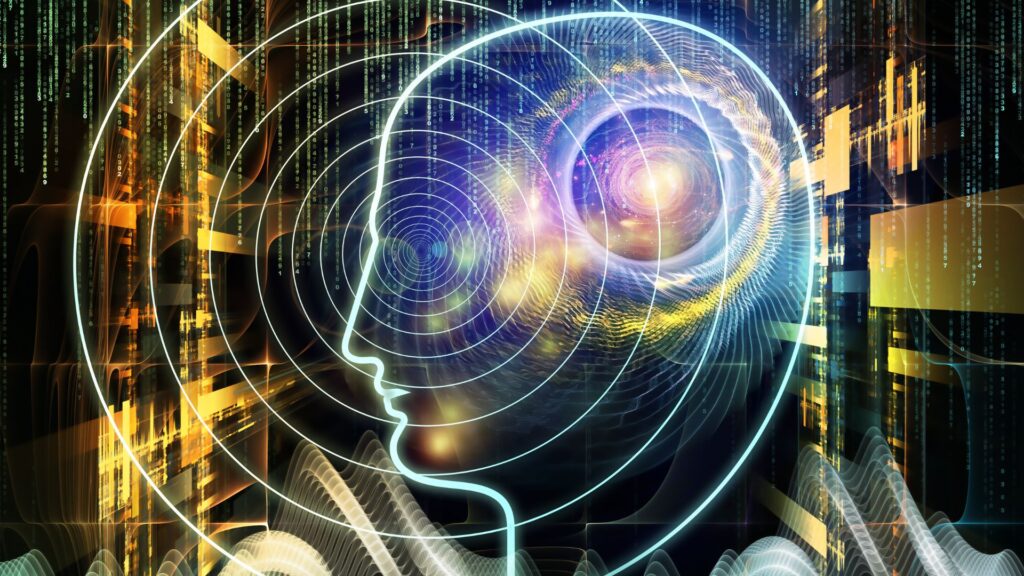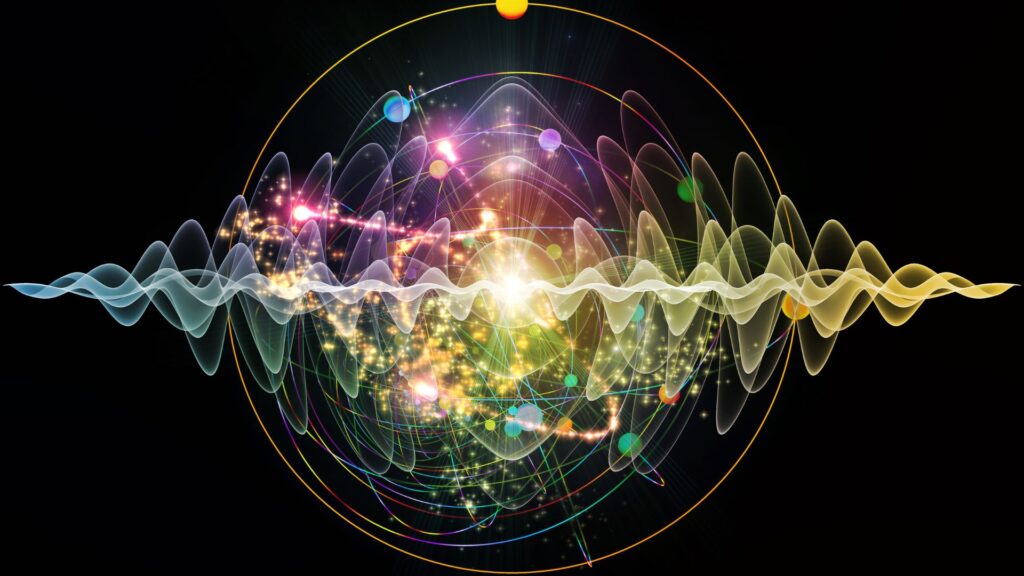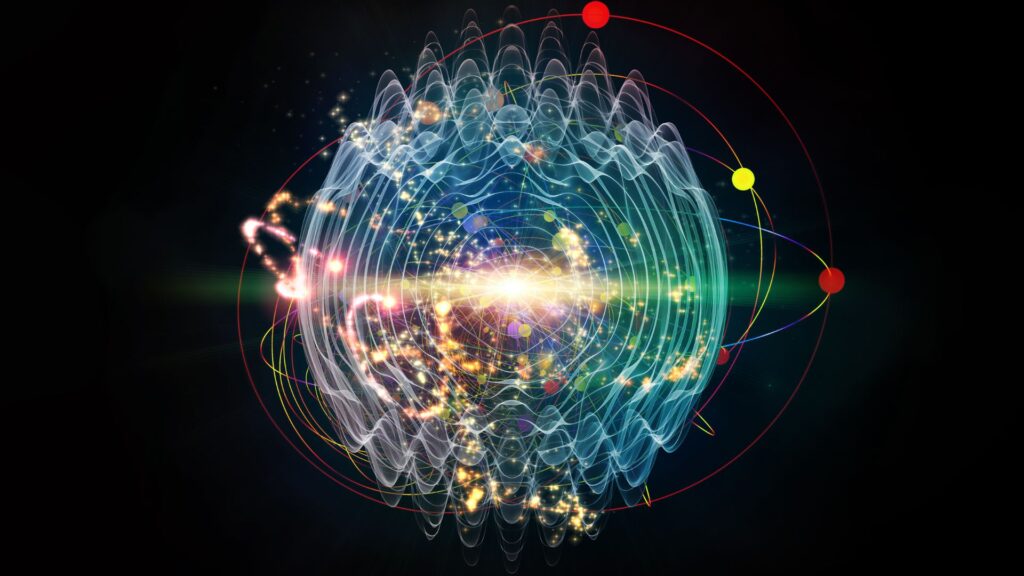The conundrum of the relationship between non-local consciousness and quantum physics is a subject that has befuddled scientists and philosophers for decades. The notion of non-local consciousness alludes to the idea that our consciousness is not confined by physical boundaries and is not limited by space and time. This concept is often intertwined with quantum physics, as some experts posit that quantum mechanics may serve as proof for the existence of non-local consciousness.

Quantum mechanics introduces the idea of non-locality, which posits that particles can be correlated in such a way that the state of one particle can instantly impact the state of another particle, irrespective of the distance between them. This oddity, referred to as quantum entanglement, has been experimentally validated and remains one of the most mysterious aspects of quantum physics.
Several scientists and philosophers have ventured to assert that the non-local nature of quantum entanglement could potentially serve as evidence for non-local consciousness. The reasoning is that if quantum particles can be connected beyond space and time, then it’s possible that our consciousness could exist in a non-local state and that our minds could be interconnected in a similar manner.

Critics argue that there’s no concrete evidence to support the notion of non-local consciousness and that it’s simply speculative. They also contend that the non-local aspect of quantum mechanics is a result of mathematical descriptions of particle behavior and doesn’t necessarily imply the existence of a non-local realm of reality.
In spite of the lack of tangible evidence, the relationship between non-local consciousness and quantum physics remains a captivating area of inquiry, with numerous scientists and philosophers delving into the implications of these concepts. Some have suggested that non-local consciousness could offer a novel understanding of reality and could have significant ramifications for our comprehension of consciousness, the mind-body problem, and reality itself.

One of the primary challenges in exploring the relationship between non-local consciousness and quantum physics is the lack of a clear understanding of consciousness. Consciousness is a complex and subjective experience that’s challenging to study scientifically. Despite this obstacle, scientists and philosophers have attempted to approach the issue of non-local consciousness from various perspectives, including quantum mechanics, neuroscience, and philosophy.
One avenue of exploration is to investigate the relationship between quantum mechanics and the brain. Some scientists believe that the non-local aspect of quantum mechanics could provide a framework for comprehending the workings of the brain and that quantum entanglement could play a role in brain function. However, this idea remains highly speculative and is still the subject of ongoing research and debate.

Another approach is to examine the implications of non-local consciousness for the mind-body problem. The mind-body problem is a philosophical challenge that seeks to explain the relationship between mental experiences and physical bodies. Some scientists and philosophers believe that non-local consciousness could provide a solution to this problem, suggesting that our mental experiences are not limited by our physical bodies but exist in a non-local state.
Finally, some experts have delved into the implications of non-local consciousness for our understanding of reality itself. If consciousness exists in a non-local state, it could have far-reaching ramifications for our comprehension of reality and our place in the universe. For instance, some have proposed that non-local consciousness could offer a novel understanding of the relationship between the self and the world and that our subjective experiences are not limited by the physical world.

In conclusion, the relationship between non-local consciousness and quantum physics is a complex and controversial subject that continues to be explored by scientists and philosophers. Despite the lack of concrete evidence to support non-local consciousness, the concept remains intriguing and holds the potential to offer novel insights into consciousness, the mind-body problem, and Amidst the enigmatic intersection of quantum physics and non-local consciousness, lie decades of contemplation by scientists, philosophers, and researchers alike.

The notion of consciousness transcending beyond the physical body, unfettered by time and space, represents the epitome of the non-local consciousness idea. This idea, while shrouded in mystery and yet to be fully understood, has garnered considerable interest due to its potential association with quantum mechanics.
Quantum non-locality, an enigmatic concept in its own right, posits that the state of one particle can instantaneously impact another particle, regardless of the physical distance between them. This perplexing aspect of quantum mechanics, known as quantum entanglement, has been demonstrated experimentally and is considered one of the most bizarre and mysterious facets of the field.

As a result, many scientists and philosophers believe that the non-local nature of quantum entanglement could provide evidence for non-local consciousness. If particles can be correlated in a way that transcends time and space, it is possible that consciousness, too exists in a similar, non-local state. Our minds could then be interlinked in a mysterious and unexplainable way.
Critics, however, argue that there is a lack of experimental evidence to support non-local consciousness and that it remains purely speculative. The non-locality of quantum mechanics, they contend, is a result of mathematical descriptions of particle behavior and does not imply the existence of a non-local realm of reality.

Despite the absence of direct evidence, the relationship between non-local consciousness and quantum physics remains a captivating and intriguing area of study. Scientists and philosophers have attempted to delve into this subject matter from multiple angles, including quantum mechanics, neuroscience, and philosophy.
One avenue of exploration is the examination of the relationship between quantum mechanics and the brain. Some scientists have proposed that the non-local nature of quantum mechanics could provide a framework for understanding the inner workings of the brain, with quantum entanglement playing a role in its functionality. This idea, however, remains highly speculative and the subject of ongoing research and debate.

Another avenue of exploration is the consideration of the implications of non-local consciousness for the mind-body problem, a philosophical conundrum of explaining the relationship between mental experiences and physical bodies. Some scientists and philosophers suggest that non-local consciousness could provide a solution to this problem, with mental experiences existing in a non-local state beyond the confines of the physical body.
Lastly, some have delved into the implications of non-local consciousness for our understanding of reality itself. If consciousness exists in a non-local state, it could have far-reaching implications for our understanding of the universe and our place in it. For instance, non-local consciousness could provide a new understanding of the relationship between the self and the world, suggesting that subjective experiences are not limited by the physical realm.

In conclusion, the relationship between non-local consciousness and quantum physics is a complex and controversial topic that continues to garner attention from scientists, philosophers, and researchers alike. While the notion of non-local consciousness remains largely speculative, with much more research and experimentation needed, it has the potential to offer new insights into the nature of consciousness, the mind-body problem, and the universe.
As with any scientific and philosophical pursuit, it is essential to approach the topic with an open mind and a critical eye, avoiding claims that go beyond what is currently supported by the evidence. The relationship between non-local consciousness and quantum physics remains a fascinating and important area of study that will continue to be explored in the coming years.
